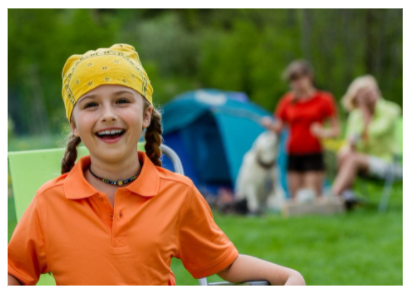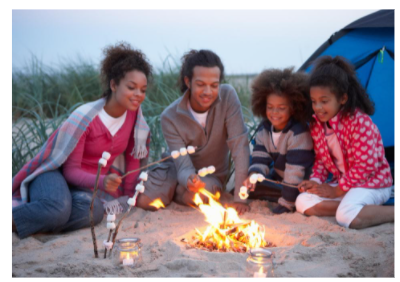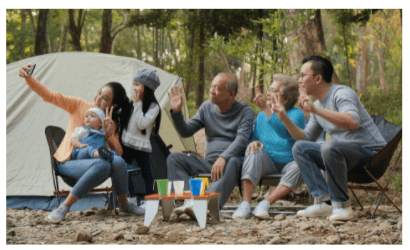When you’re a family, lots of things are a little more challenging. Camping is definitely one of them, as the planning necessary for a camping trip seems to increase several times over when you’re dealing with kids, jobs and all of the other complications of life.
Never fear! We’ve got the rundown on all the things that will help make your camping trip a well-organized endeavor from the get-go. From what to bring camping to what to do once you’re there, we’ll help you navigate the ins and outs of planning a family camping trip.
Date and Location
The first thing you’ll need to do is establish when and where you want to go camping. When camping with kids, it’s usually best to choose a well-maintained campground with amenities like bathrooms, fire pits and running water. Local state parks and private campgrounds are usually good bets.
Once you’ve chosen a campground, find out how far in advance you need to reserve a campsite. Weekends are the time that works best for most families to go camping, but if your schedules will allow you to go during the week, you might find less crowded campsites and more affordable rates.
Next, it’s time to take a look at the weather. If you have to book your campsite more than a week in advance, the weather will always be something of a gamble, but looking at the forecasts can give you a general idea of what to expect even if it’s not perfectly accurate. Keep an eye on how the forecasts change as you approach the date and be ready to figure out an alternate plan if it becomes clear that the weather isn’t going to cooperate.
Family Camping Trip Activities
You should also put some thought into activities for your family camping trip. Start by looking at the activities available at the campground. These will often include fishing, hiking, swimming, bird watching and other classic camping pastimes. Make your must-do list, would-be-nice list and do-if-there’s-nothing-else list.
Ask your family members what they’re interested in and make sure that everybody gets a little time to do the things they like most. Some families will want to stay together the whole time, while others might want to split up so everyone can get a chance to do their favorite stuff. If you think your kids will want to do different activities, make sure to plan for how you’ll split them up to ensure that everyone has adequate supervision.
On the other hand, you should resist scheduling things too tightly and plan for frequent breaks in whatever activity you choose. Think about bringing along some other forms of entertainment as well, such as board games or books. You might have a little downtime in which you find that a little bit of quiet reading is just what you wanted.

What to Bring on Your Family Camping Trip
Start with what outdoors experts refer to as the Ten Essentials. These are the items that every camping trip should include:
- Shelter: Camping obviously requires shelter. Bring enough tents for everybody to sleep comfortably, and make sure to bring the rain fly!
- Navigation: A map, a GPS and even a compass are important to have for emergency navigation. On most family camping trips, you probably won’t be venturing far into the backcountry where these become truly necessary, but they’re important to have just in case.
- Fire: Grab a tough flint lighter and some lighter fluid, and keep some camping matches in a waterproof container just in case.
- Knife: Bring a good sharp pocket knife, or preferably a multi-tool.
- Insulation/Rain Gear: Even if the weather report looks good, you need to be prepared if things take a bad turn. Pack for the worst conditions you might reasonably encounter and bring an extra set of clothes for everyone.
- First Aid Supplies: You never want to be caught without first aid supplies in a medical emergency. A basic camping first aid kit can save a life while you get medical attention for someone with an injury.
- Illumination: If you can, bring headlamps since they’re hands-free, but a flashlight or two will work just fine. Don’t forget a backup supply of batteries.
- Food: Well, you’re going to need to eat, right? Bring the camping classics like hot dogs and s’mores materials, but don’t forget nutritious snacks for hiking and bring a little more than you think you need.
- Hydration: Most campsites today have running water, but you never want to be caught in the woods without fresh water. Bring a few jugs of drinking water in case of an emergency. It’s much better to have and not need!
- Sun Protection: Every member of your family needs adequate protection from the sun. Pack sunscreen, hats and sunglasses at least. If it’s not too hot, long pants and long-sleeved shirts can also work.
Safety Planning
Going into the great outdoors always involves some element of risk. Get your safety and emergency plans squared away by considering these questions:
- Where is the nearest source of professional medical treatment?
- Are there park rangers or other authorities that you can go to for help?
- Are there known dangers from wild animals, such as bears or coyotes, in the area?
- Is your campsite near areas such as cliffs or rivers that you’ll need to keep children away from?
- Will your campsite be isolated from strangers, or will you be near other people?
- Will you have cellular service, or will you need to make alternate plans for reaching assistance?

Every good family camping trip starts with successful planning. The better you craft your basic plan, the more you’ll be able to enjoy the spontaneity and happy accidents of the best camping trips. And if something does take a turn for the worse, you’ll have the plans in place to deal with it safely.

Leave a Reply
You must be logged in to post a comment.